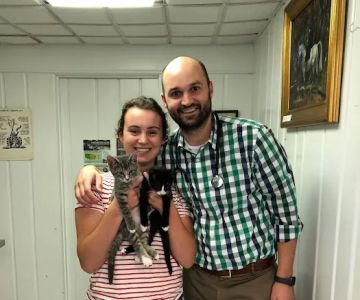Can You Study Only Mammals to Become a Veterinarian?
- 1 - The Path to Becoming a Veterinarian
- 2 - Specializing in Mammals
- 3 - Educational Requirements for Veterinarians
- 4 - The Role of a Mammal Veterinarian
- 5 - Advantages and Challenges of Focusing on Mammals
- 6 - Real-Life Stories from Mammal Veterinarians
- 7 - Steps to Taking the First Action
1 - The Path to Becoming a Veterinarian
Becoming a veterinarian is an exciting journey, and many people choose this path to work with animals, particularly mammals, which are among the most commonly kept pets and livestock. However, what if you're specifically interested in studying mammals? Is it possible to specialize early in your career? In this article, we’ll take a deep dive into the process of becoming a veterinarian with a focus on mammals and explore whether it’s feasible to study just mammals during your veterinary education.
2 - Specializing in Mammals
When it comes to becoming a veterinarian who specializes in mammals, there are several important considerations. While veterinary school curriculum typically provides a broad overview of different species, including birds, reptiles, and amphibians, focusing on mammals in particular is a feasible option during your career. The term “mammal veterinarian” encompasses professionals who work exclusively with animals like dogs, cats, cattle, and even exotic mammals such as primates.
Although you cannot entirely limit your studies to just mammals in the early stages of vet school, you can certainly tailor your experience toward them in later stages, especially through internships and residency programs that focus on mammalian care. Many veterinary programs allow students to specialize in certain areas in their final years, and some schools even offer additional training or electives focused specifically on mammals.
3 - Educational Requirements for Veterinarians
To become a veterinarian, the first step is to obtain a Doctor of Veterinary Medicine (DVM) degree. This requires completing a bachelor's degree in a related field like biology, animal science, or zoology, followed by admission to an accredited veterinary school. Veterinary programs typically take 4 years to complete, and the curriculum covers a wide range of animals, from small pets to large farm animals, including mammals.
As mentioned earlier, during your veterinary education, you will learn about various animal species. However, if your ultimate goal is to specialize in mammals, you should focus on gaining experience with them during your clinical rotations. By selecting electives or working with mentors who specialize in mammalian care, you can narrow your focus toward the specific field you are passionate about. This allows you to build a deep knowledge base of mammalian anatomy, diseases, and treatments.
4 - The Role of a Mammal Veterinarian
A mammal veterinarian typically provides medical care to a variety of mammalian species, including domesticated animals like cats and dogs, as well as livestock such as cows, pigs, and horses. They diagnose, treat, and manage the health of mammals, dealing with everything from routine check-ups to complex surgeries. Some mammal veterinarians may also focus on specific subgroups, such as wildlife veterinarians who work with wild mammals, or exotic animal veterinarians who specialize in small or unusual mammals.
In addition to medical treatment, mammal veterinarians often provide preventive care, such as vaccinations and parasite control, to help ensure the long-term health of the animals. Moreover, some mammal veterinarians specialize in breeding, reproduction, and genetic counseling for mammals, helping with the care and management of species in both private and public settings.
5 - Advantages and Challenges of Focusing on Mammals
Specializing in mammals as a veterinarian offers numerous advantages. One of the key benefits is the sheer variety of species within the mammalian group. From household pets to large animals and wild mammals, the range of patients you could work with is vast. This diversity makes the job both exciting and rewarding, as each day offers new challenges and learning opportunities.
However, focusing on mammals also presents unique challenges. For example, some veterinarians choose to work with domesticated animals like dogs and cats, which are often treated in clinical settings, while others may work with larger farm animals, which could involve traveling to farms and handling more complex cases. Furthermore, working with exotic mammals often requires specialized knowledge and training in dealing with animals that are not commonly kept as pets or livestock.
6 - Real-Life Stories from Mammal Veterinarians
To give you a better idea of what it’s really like to specialize in mammals, here are some real-life stories from veterinarians who have made this their career choice. Dr. Samantha Johnson, a wildlife veterinarian based in California, spends her days treating everything from coyotes to mountain lions. She shares that her path to specializing in mammals wasn’t straightforward, but through volunteering at wildlife rehab centers and internships with experienced veterinarians, she honed her skills and is now living her dream working with wild mammals.
Another example is Dr. Michael Lee, an exotic mammal veterinarian who focuses on treating primates and other rare species in zoos. He mentions that his love for animals started early, but his journey into vet school was full of challenges, especially balancing his passion for mammals with the rigorous demands of veterinary education. Nonetheless, his determination paid off, and he now treats some of the most fascinating creatures on the planet.
7 - Steps to Taking the First Action
If you’re considering becoming a mammal veterinarian, the first step is to research veterinary schools and their specific programs. Look for schools that offer elective courses or additional training related to mammals. You’ll also want to gain hands-on experience working with mammals as much as possible, whether through internships, volunteer work at animal shelters, or shadowing experienced veterinarians in your area.
Ultimately, becoming a mammal veterinarian takes hard work, dedication, and a passion for animals. But with the right focus and effort, it’s entirely possible to make a career out of studying and working with mammals. So, if you’re ready to embark on this rewarding path, start researching schools, reaching out to professionals in the field, and getting the hands-on experience that will help you succeed in your journey.











